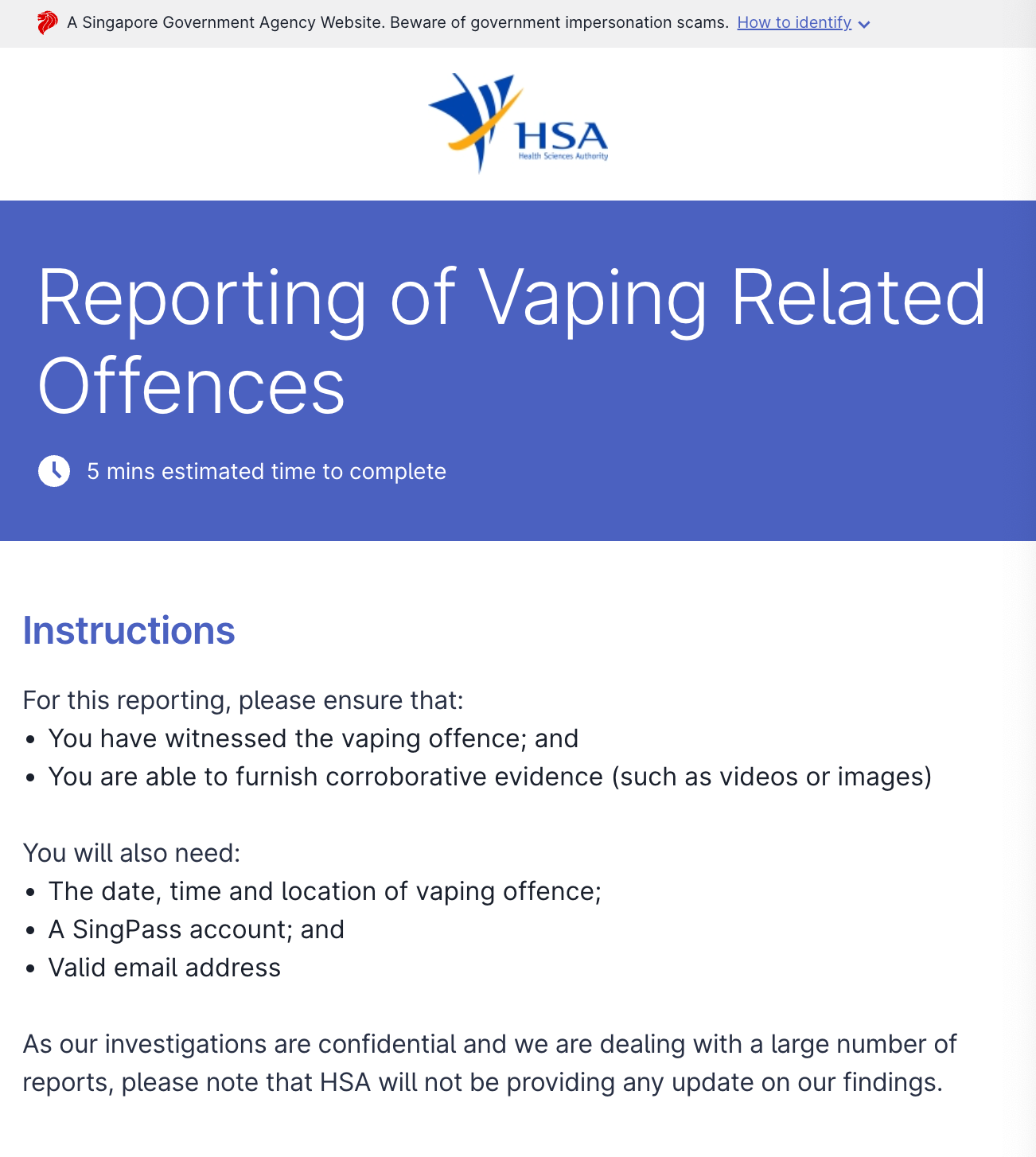Altering States is a secondary newsletter that I run within We, The Citizens, focused on drugs and drug policy. It's irregular and always free. When you subscribe, you can choose either We, The Citizens or Altering States, or, better still, both!
(1)
There’s no escape; it’s all over the news that Singapore is coming down hard on vapes. I’ve already covered this in a long issue plus in the last WTC wrap, so I don’t want to repeat myself too much.

In a nutshell, the government has decided that vaping is the new enemy, and they’re going all out with their favourite response: criminalisation and punishment. They don’t care if it’s a regular nicotine vape or a Kpod—they’re all the devil’s puffers.
“The vapes themselves are just delivery devices. The real danger is what's inside,” said Prime Minister Lawrence Wong during his National Day Rally speech. “Right now, it's etomidate. In future, it could be something worse, stronger, far more dangerous drugs.”
He’s not wrong; the e-vaporisers are delivery methods, and the contents of these unregulated, illegal vapes are pretty dangerous. But this logic could technically be applied to loads of things to justify crackdowns that we'd recognise as totally absurd. Last month in Australia, a woman was convicted of murdering three relatives by feeding them a beef wellington made with poisonous mushrooms. So I guess we could say that pastry is merely a delivery method, who the heck knows what’s inside, and therefore, for safety, we should ban not only beef wellingtons but also sausage rolls, pies, and curry puffs. All sorts of things can be delivery devices for potentially dangerous things. Wine bottles could be delivery devices for a delicious merlot or some sort of homebrew that'll make you go blind (but we don't worry about that in Singapore because alcohol is legal and regulated up the wazoo!)
There’ll be no end to this logic of disproportionate banning, because this is not a strategy that makes sense. Criminalisation—which means no regulation because everything is forced underground—creates opportunities for syndicates to not only meet demand but go for whatever’s most addictive and profitable to ensure more demand and make more money. And anyone who gets caught using or in possession will have their lives further disrupted or even wrecked by punishment. It leaves all of us more vulnerable and precarious.
Etomidate—the anaesthetic agent that keeps appearing in Kpods these days—is going to be listed as a controlled drug under the Misuse of Drugs Act by 1 September. This means that anyone caught using a Kpod will be treated like a drug user and subjected to the same consequences that people who use other drugs face: mandatory drug detention, drug supervision, etc. In other words, measures that aren’t working all that well for many of the people who’ve already been put through them. It was found, for instance, that while drug supervision is focused on making sure that people desist from the act of drug consumption, people learn to game the system, and it might actually hamper other aspects of desistance that will help create a more lasting and meaningful change.
As part of this new war against vaping, Singaporeans are encouraged to snitch (what’s new?) and report people using vapes to the authorities—they’ve even set up an official form for you to do this reporting. Please keep in mind that you’re going to need a SingPass account and also videos or photos of the scandalous vapour-sucking.

Prosecutors from the Health Sciences Authority are also going to review sentencing submissions for all vape cases. A district judge adjourned guilty plea mentions because he thought that the prosecutors should review the sentences they’re asking for. This means that the prosecution could now change their submissions and start asking for harsher penalties.
(2)
Now we go in the opposite direction. In a bid to try to revive Singapore’s currently miserable nightlife scene, the government is allowing F&B and nightlife spots in Boat Quay and Clarke Quay to apply to extend their liquor licences until 4am on Fridays and Saturdays, as part of a year-long trial. A 16-year moratorium on allowing new nightlife venues in the area has also been lifted.
K Shanmugam, the Minister for Home Affairs, said that the government has been talking to business associations to “make sure the place is lively” because “it’s part of the attraction of Singapore as a whole”. After feedback, they’ve decided to open up more, while making sure to ensure law and order now that people can get boozy for longer. This was welcomed by nightlife businesses, but it’s not quite taken off yet. Last Friday was the first night the new rules kicked in, but everyone was still being careful. As of 18 August, the police had approved just six applications out of more than 200 outlets. More do say that they’ll be applying, though. Also, the crowds weren’t as big as they could be—we’ll have to wait and see if that changes over this year.
This is an example of what the government can do with regulation: fiddle with licensing rules, run trials, work with legal business operators to ensure safety and mitigate risks. Whether it’ll work to revive the nightlife scene remains to be seen, but at least they’re not tripping over themselves to arrest people in this case.
Learning and reflecting
Given the focus on young people using Kpods, I’ve been reading through this paper on substance use among young adults. The experts propose some “principles of care”; I won’t list them all, but here are some that jumped out at me (with excerpts):
“Young adults should have access to a comprehensive set of assessment, psychosocial and pharmacologic treatment, harm reduction, and recovery services supported by evidence.”
The workgroup clarified that young adults with opioid, alcohol, and tobacco use disorders should uniformly be offered US Food and Drug Administration (FDA)-approved medications to address cravings and withdrawal. Options include buprenorphine, methadone, and naltrexone for [opioid use disorder]; naltrexone, acamprosate, and disulfiram for alcohol use disorder; and varenicline, bupropion, and nicotine replacement therapy and nicotine use disorder.
All young adults with [substance use disorder, or SUD] (regardless of readiness for treatment) can benefit from harm reduction services. Overdose education should include naloxone provision to all patients who use opioids and their family members. Additionally, the workgroup highlighted that support services (such as that offered by a recovery coach) can be layered onto treatment to promote recovery, support achievement of educational and employment goals, and resume prosocial and other recreational activities.
“Respecting the diversity of young adults, services should be tailored to individual strengths and needs, using the least restrictive environment possible.”
At higher levels of care [...] young adults generally have less autonomy and are less able to pursue their educational and employment goals or engage in prosocial activities, all of which are critical to their continued development and sustained recovery. The most restrictive environments—particularly those imposed by involuntary commitment to addiction treatment—almost entirely limit young adults’ autonomy and may be associated with adverse outcomes such as overdose. Outpatient management of SUDs (even when severe) is often possible, not inferior to higher levels of care, and associated with better long term outcomes.
“To maximize engagement, young adults should enter care voluntarily. External leverage should be used strategically, but involuntary commitment should be a last resort and when used, it must be as good as or better than non-coercive care.”
Although some may view involuntary commitment as an important way to compel a young adult with a SUD into treatment, there are reasons to be concerned about this approach. In some states, individuals who are committed are placed in jail settings where their autonomy and civil liberties are limited. In these settings, young adults are often housed with older individuals, often including those with more severe SUD. Critically, state laws generally do not specify that evidence-based treatment must be provided in mandatory treatment facilities, and pharmacotherapy is often withheld, placing individuals with SUD (particularly those with OUD) at elevated risk for relapse and overdose following discharge.

Thank you for reading! As mentioned above, Altering States will always be free to access, so please share this with anyone who you think might be interested. If you’d like to support my work, please consider subscribing to We, The Citizens or leaving a tip!


